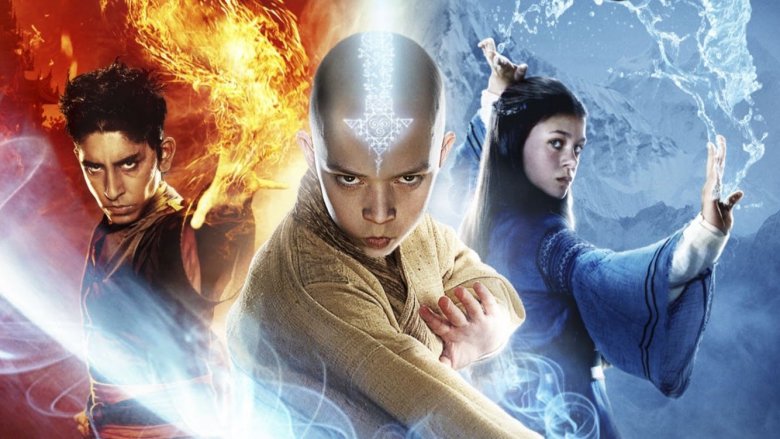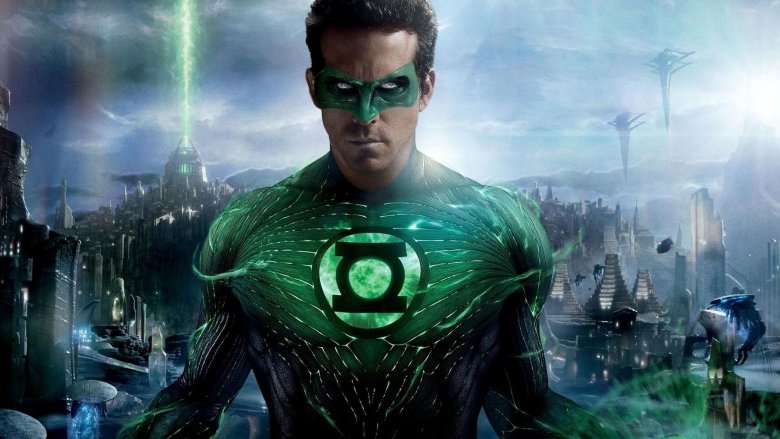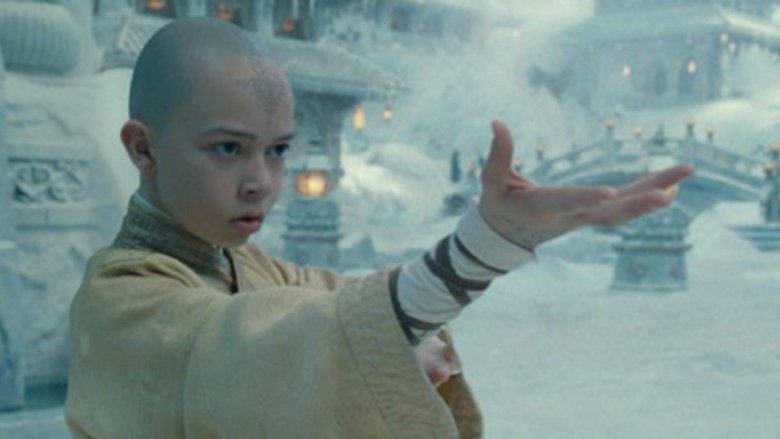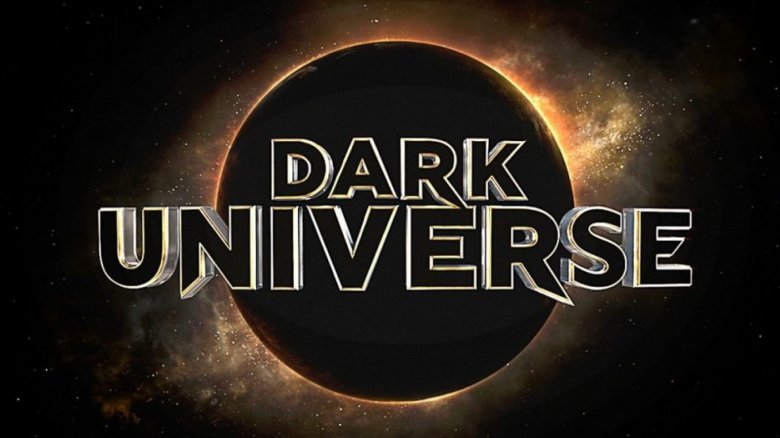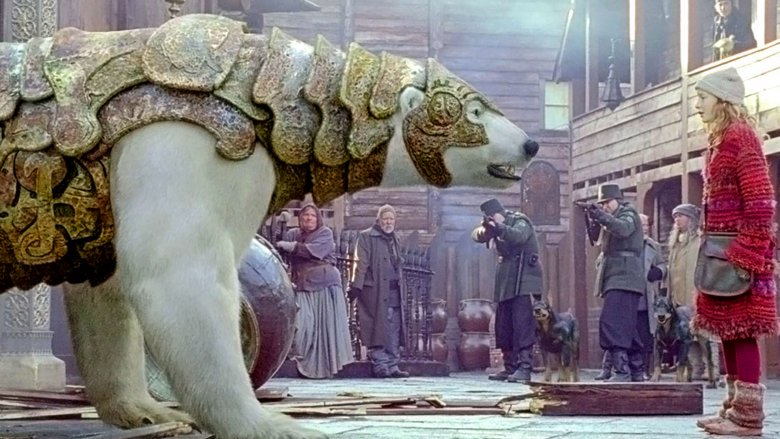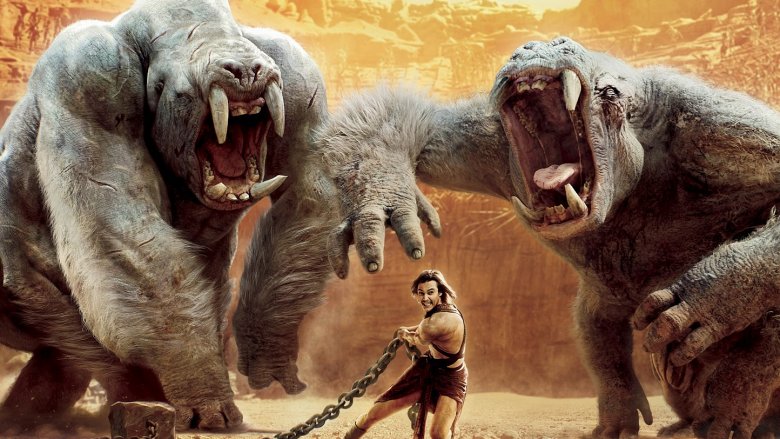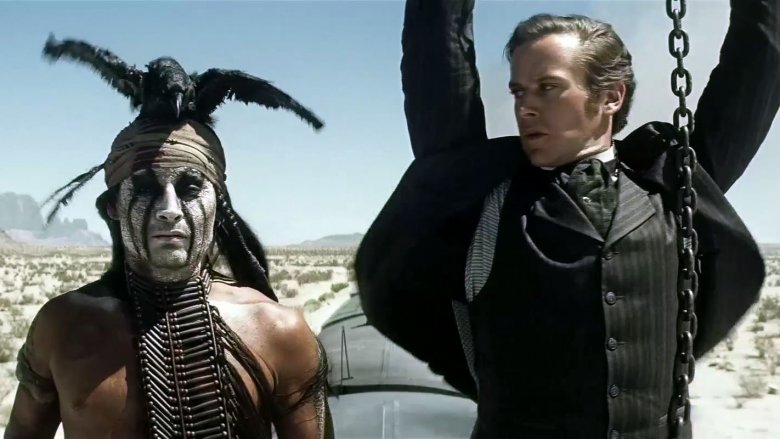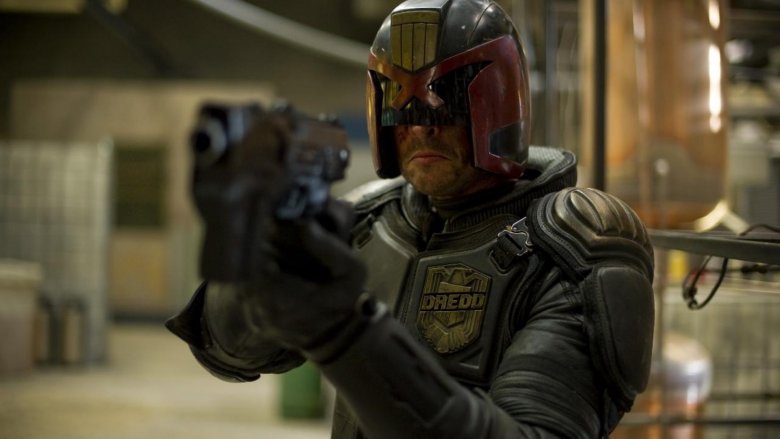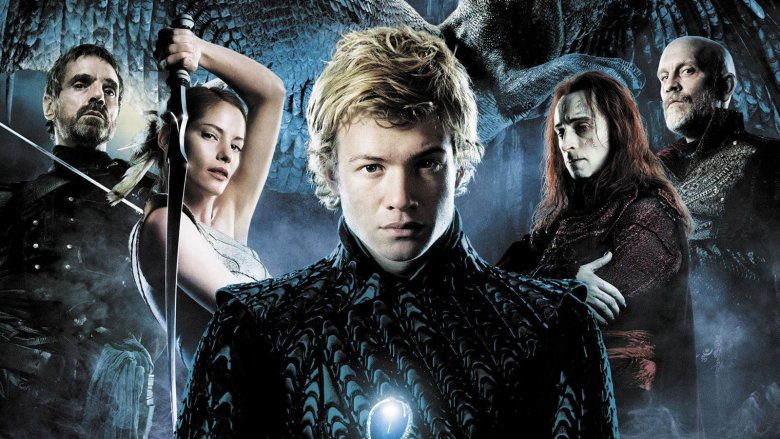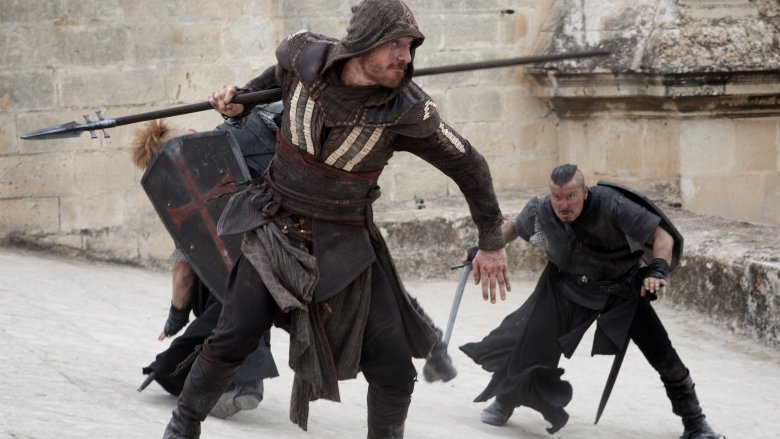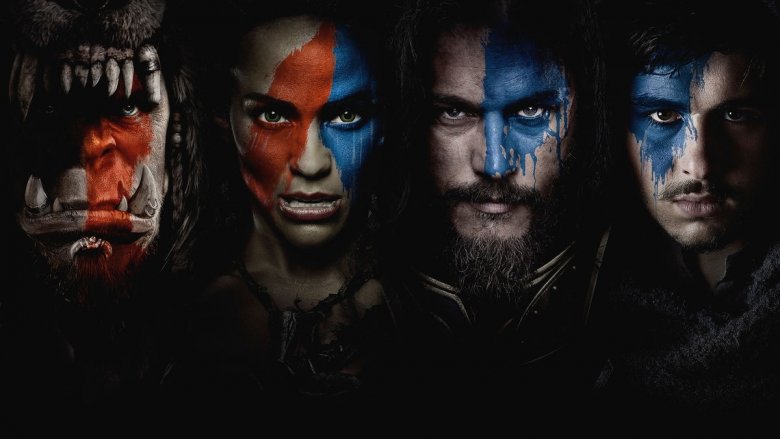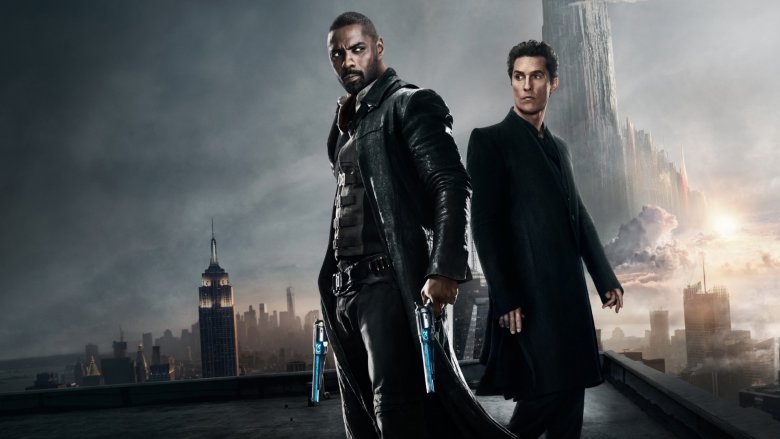Movie Franchises That Died After The First Film
Not every movie can print money like it's a part of the Marvel Cinematic Universe, but that doesn't keep studios from trying. Starry-eyed movie executives are always looking for the next big franchise, searching endlessly for a hit that can spawn sequels and generate guaranteed cash for years — maybe decades — to come. It helps that fans are always clamoring for their favorite books, comics, video games, and cartoons to get the multi-million-dollar big screen treatment.
Unfortunately for both fans and studios, not everything catches on. Sometimes, they end up with a lackluster adaptation that's missing the spark of the original work. Other efforts turn out to be enjoyable cult hits that just don't rack up enough revenue to justify a sequel. No amount of failure is going to scare studios away from throwing money at what just might be the next major franchise to light the world (and their bottom line) on fire. Here are some of those would-be franchises that failed to launch.
In blackest night
Green Lantern is a lot of things. It was DC's first foray into a non-Batman or Superman-related movie in the modern era. It was a vehicle for Ryan Reynolds, whose star has only shone brighter since. It was a movie so caked in CGI that it can be tough to remember any scenes that aren't bathed in an iridescent green glow or don't feature someone with a distracting, abnormally large head. One thing Green Lantern is not, though, is good.
While there was plenty of advance buzz about its promised adherence to fan-favorite comic stories, once it released, fans and critics alike quickly turned on Green Lantern. The hostile reception not only spelled doom for a direct sequel, but also shook up Warner and DC's plans for the direction of their cinematic superhero universe. Green Lantern barely made back its $200 million budget, even after factoring in both domestic and foreign gross. Critics largely hated it, even at a time before superhero movie burnout had set in.
The DC movies that eventually followed took some odd lessons from Green Lantern's failure. Instead of seeing that fans were rejecting a generic, lifeless script, it seems like someone in the creative hivemind at Warner Bros. assumed that the bright colors and attempts at humor were the problem. This would explain the excessive gunmetal greys and very serious posturing of films like Man of Steel and Batman v Superman: Dawn of Justice. Fortunately for Ryan Reynolds, his career didn't take too bad of a hit, and he got to hit back with a bevy of Green Lantern-related jabs once the mega-successful Deadpool movies rolled around.
Emphasis on Last
Avatar: The Last Airbender was a revolutionary animated show on Nickelodeon that built a fantasy world inspired by martial arts and Asian mythology. The Last Airbender, directed by M. Night Shyamalan, is a lifeless, drab, white-washed adaptation of only a fraction of the first season of the original show. In 2010, Shyamalan's star had already started to fade in the critical eye after Lady in the Water and the baffling eco-horror movie The Happening left fans wondering if the auteur had lost his way. The Last Airbender (which had to drop "Avatar" from its title to avoid confusion with James Cameron's Unobtanium-centric sci-fi epic) was Shyamalan's first attempt at directing a movie based on a concept he didn't create. It was a chance for redemption... or, at least, for something different.
Instead of a Prince Zuko-like redemption, the film's ubiquitous panning served as just one more nail in the coffin of Shyamalan's public profile — something that wouldn't start turning around until the success of Split. Last Airbender didn't just take a critical drubbing, it also failed to recoup its production budget of $150 million, which almost guaranteed audiences would never see the rest of the live-action adventures of Aang, Sokka, and Katara. Nickelodeon had essentially disavowed the entire debacle by the time the 2011 Kids' Choice Awards rolled around — not only did The Last Airbender go home without a win, it wasn't even nominated at the show run by its own production company.
The dark (almost) universe
The Dark Universe is a masterclass in putting the cart before the horse. The classic Universal Monsters getting a modern spin in a shared timeline isn't exactly a bad idea, but announcing the grand plan before a single movie came out may have sunk the whole franchise from the start. To make things even weirder, 2014's Dracula Untold, not originally intended to be a part of a larger spooky world, was patched in at the last second with a post-credit sequence which brought its bloody prince into the modern day.
Fast forward a couple of years to the 2017 Empire cover story featuring a murderer's row of character actors meant to anchor the Dark Universe. It featured Sofia Boutella as the Mummy, Russel Crowe as Dr. Jekyll, Javier Bardem as Frankenstein's Monster, and Johnny Depp as the Invisible Man. It also featured Tom Cruise as the generic action movie protagonist of the newly rebooted The Mummy.
Unfortunately for Universal, their new take on The Mummy underperformed, taking in just $80 million domestically with an estimated $125 million budget. It was a hit internationally, raking in $329 million overseas, but the low domestic take may have been enough for Universal to rethink their grand plans. They've put The Bride of Frankenstein back in the dirt, and all other future Dark Universe movies seem to be either cancelled or hanging in limbo. Alex Kurtzman and Chris Morgan, who Universal hoped would be the Kevin Feige to their MCU, have since moved on to other projects, including Star Trek: Discovery and the Fast and the Furious franchise.
A golden opportunity
Philip Pullman's His Dark Materials novels are beloved by readers, a modern classic of sorts. The live-action movie adaptation of the first book in the series, The Golden Compass (the book was known in the U.K. as Northern Lights), tried to lend its production the appropriate amount of gravitas by stacking the deck with a sky's worth of stars, including Nicole Kidman, Daniel Craig, Ian McKellen, Eva Green, Sam Elliot, and Christopher Lee. The series' young protagonist, Lyra Belecqua, was played by newcomer Dakota Blue Richards.
The movie faced a bit of controversy, stemming from the source material's critical take on organized religion. Changes to the core narrative attempted to alleviate the issue, but ended up splitting the difference and not pleasing anyone. A 2007 article from Newsweek cheekily pointed out that The Golden Compass was "accused of being both anti-Catholic and not anti-Catholic enough." Alienating book fans and failing to appeal to newcomers, the movie apparently wasn't profitable enough to warrant a sequel. With a budget of $180 million, it only brought in $70 million stateside (though it fared much better overseas, raking in in $302 million in foreign markets).
Fans don't need to worry too much. In the decade since The Golden Compass hit theaters, Pullman has released the first novel in a followup trilogy and the BBC is working on a television version of His Dark Materials, which will be shown on HBO in the U.S. The new series' cast is anchored by James McAvoy and Lin-Manuel Miranda.
See you, space cowboy
John Carter is a bizarrely indistinct title for a movie about a Civil War soldier being whisked off to Mars to hang out with a bunch of ten-foot-tall, six-armed aliens and a space princess named Dejah Thoris. The nondescript name seems like even more of a missed opportunity once you take into account the story on which it's based, Edgar Rice Burroughs' A Princess of Mars, which has such a wondrous, evocative title that it would be hard to walk past the theater marquee without having your interest piqued. The film was originally going to be titled John Carter of Mars, but at some point during the production, the name was truncated to the three boring syllables that advertisers had to spin into something interesting. Maybe keeping something about how most of the movie takes place on a fantastical sword-and-sandal version of the Red Planet would have helped the movie do more than barely surpass its massive $250 million budget.
There were, of course, more problems than simple naming conventions facing John Carter, like an untested star known mainly for TV (Friday Night Lights' Taylor Kitsch) and a director whose only experience had been in animation (Pixar's Andrew Stanton). While Carter's adventures on Barsoom (the martians' name for their own planet) have their moments, the movie lacks some of the whimsy that Stanton was able to spin with his previous animated efforts like Finding Nemo and Wall-E. As much fun as the action sequences can be — particularly an early highlight of Carter getting to test out how his physical abilities are amplified by Mars' lower gravity — a lot of the rest of the running time is taken up by big bug people spouting exposition. Unfortunately, the untapped potential of the 11 books in the Barsoom series will have to remain untapped, since Disney barely seems to acknowledge that the film exists at this point.
The lone film in this franchise
Similar to John Carter, The Lone Ranger resurrected (literally) a pulp hero for a new age. Oddly enough, also similarly to John Carter, it played with some incredibly uncomfortable "Noble Savage" imagery and tropes with Johnny Depp's rendition of Tonto. In fact, criticism of the film's handling of Tonto pretty much overtook any other discussion of The Lone Ranger. Armie Hammer is charming enough in the Jerry Bruckheimer-produced, Gore Verbinski-directed action flick that fits the tone set by the same team's Pirates of the Caribbean films. But Ranger lacked the rousing fun of Jack Sparrow's adventures, save for the occasional highlight, like a climactic Rube Goldberg-esque quarrel on top of a moving train.
Hammer's title character may have been able to come back from the dead, but the notion of a sequel to the 2013 film was dead as a doornail when the box office numbers came in. The movie had a $215 million budget, and only brought in $89 million in the United States. Critics weren't too happy with The Lone Ranger either. Filmgoers hungry for western or pulp heroes will have to go looking somewhere else to satiate that need.
Dredd is the law
Dredd is a stellar film. It's a cocktail of violence, wry humor, clever visual storytelling, and gritty bombast. The movie's stark vision of Mega City One functions as both a claustrophobic, dystopian playground for brutal firefights and a biting, almost sinister satire. A pitch-perfect Karl Urban stars as Judge Dredd as he takes his new partner — the rookie psychic Anderson, played by Olivia Thirlby — out on a routine patrol. Things, obviously, escalate. Dredd and Anderson butt up against Ma-Ma, a drug lord played with apparent glee by Lena Headey. She pushes Slo-Mo, a drug that unsurprisingly gives those who take it a time-slipping sensation. Basically, it's an excuse to showcase the film's action and violence in artful, inventive slow motion sequences.
As well-received as the movie was by fans and critics (especially when compared to the 1995 Judge Dredd film), word of mouth wasn't enough to make Dredd a financial success. Even with a modest budget of $50 million, it was only able to recoup $35 million of that worldwide. Dredd's inability to turn a profit means fans still haven't had the opportunity to see further violent big-screen misadventures in Mega City One, as vocal as Karl Urban is about wanting to don the helmet again.
The last dragon rider
Eragon is equal parts Star Wars, Lord of the Rings, and Dragonriders of Pern. The first in the Inheritance Cycle, a series of novels by Christopher Paolini, an adaptation of Eragon hit the big screen in 2006. But it didn't exactly come roaring into theaters, as the heavily dragon-based adventure only took home $75 million domestically. The movie straying just too far from the source material left fans cold, and critics were even less favorable.
Time Out's Nigel Floyd wrote that the film acts as "a painful reminder of what fantasy cinema was like before the Lord of the Rings trilogy re-wrote the rules." Most of the movie reads as someone trying to do a bad Tolkien impression with plot beats pulled straight from Star Wars. The idea of John Malkovich playing an evil king with an inexplicable name like Galbatorix seems like it would be enough to at least elevate the film to So Bad It's Good territory, but Malkovich seems like he'd rather be anywhere than the magical land of Alagaësia. Due to the critical panning and financial underperformance of Eragon, fans of the books will have to tide themselves over with the recent release of Paolini's first collection of short stories set in the universe of Eragon.
A shaky creed
The Assassin's Creed series of video games stretches across all of history and into pre-history. The Assassin's Creed series of movies only stretches across a brief period of 2016. The era-spanning, rooftop-hopping, backstabbing adventures of the hooded Assassins and their ongoing war with the Templars had a lot of cinematic potential. This was further bolstered by an impressive cast, with Michael Fassbender in the dual role of Cal/Aguilar and supporting performances from Marion Cotillard and Jeremy Irons.
Director Justin Kurzel was fresh off of 2015's Macbeth, in which he also directed Fassbender and Cotillard in a tense, lavish adaptation of the Shakespearean classic. That wasn't enough for Assassin's Creed to pull itself out of the mire in which video game adaptations so often find themselves. "Assassin's Creed had everything it needed to be a great movie and makes every wrong decision it can," according to Alternative Lens' JJ Heaton.
One of those wrong decisions was focusing much more on the present-day machinations of the sinister Templars than the decidedly more exciting adventures of Aguilar's Spanish Inquisition-based action. Instead of pre-modern parkour and knife fights, there's a shocking amount of bleak, boring offices and labs filled with expositional monologues by actors who seem like they'd rather be doing anything else. While the magic of the Assassin's Creed franchise has been its ability to work as an anthology of sorts, spanning different historical conflicts and locales, it's unlikely this film will get a follow up due to an abysmal critical reception and shaky domestic box office of $54 million.
Humans vs. Orcs
There was a time when World of Warcraft was treated as an anomaly. It captured the attention of hardcore gamers and the mainstream press in a way that made it feel monumental. It was a truly paradigm-shifting game that is still able to boast 10.1 million players as of the release of the 2018 expansion, Battle for Azeroth. Nevertheless, by the time Legendary Pictures got around to producing a Warcraft movie, the iron wasn't quite as hot as it could have been. The movie was originally announced in 2006, but took ten years to actually make it to theaters. The Duncan Jones-helmed film had a rough domestic showing, taking home just $47 million. Luckily, the movie did gangbusters abroad, raking in $386 million. If, somehow, a Warcraft sequel ever materializes, it's pretty obvious which market it will be chasing after.
The Warcraft movie itself is roughly based on the lore of the very first PC game in the franchise. It follows a handful of heroes and villains who would be instantly recognizable to fans of the games, and focuses mostly on the initial conflicts between fairly standard high-fantasy humans and hulking, tusked orcs. Warcraft was Jones' first adaptation, and the narrative inventiveness of his original stories like Moon and Source Code is nowhere to be found. There's plenty of CGI wonderment to behold, but very little of anything else.
As James Berardinelli of Reel Views wrote, "Large scale battles and magical pyrotechnics are nice supplements but the absence of well-formed characters and a meaningful narrative render such pretty things moot." Berardinelli wasn't the only critic with harsh words for the video game movie — Warcraft is stuck with a dreadful showing on Rotten Tomatoes.
The gunslinger misses his mark
Oh, what could have been. The Dark Tower was supposed to be the start of something special — fans of Stephen King's magnum opus tend to speak about it in hushed, excited tones. A twisting, unique take on the traditional fantasy novel narrative, The Dark Tower spans eight books as it upsets every expectation readers might bring to the table concerning genre fiction. The film version, tragically, doesn't achieve a whole lot. Its biggest sin may be wasting an absolute one-two punch of a casting decision in Idris Elba and Matthew McConaughey.
The focus of The Dark Tower quickly shifts away from Elba's Arthurian gunslinger to a young boy destined for great things. BuzzFeed's Alison Willmore wrote, "The fact that Elba gets consigned to being a surly sidekick and surrogate father figure as much as he is an action hero suggests that Hollywood still doesn't know what to do with him." Still, that's just one glaring flaw in a long list.
The film is impenetrable and boring, lacking the verve of King's prose and the wonder of the world he built over two decades in his novels. Critics came hard for The Dark Tower, saddling it with a grim ranking on Rotten Tomatoes. But all may not be lost — even if the movie wasn't a bullseye, Amazon Studios is preparing a TV series that would be a fresh start for the Gunslinger and his nemesis.
